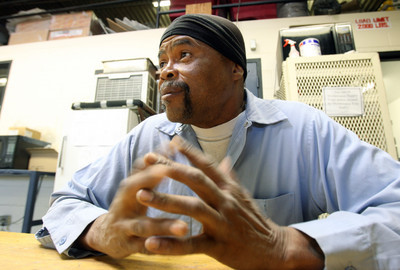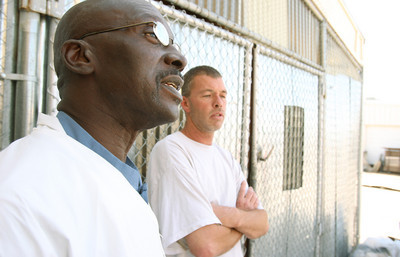Prisoners forced to give up tobacco have until July 1 to kick habit cold turkey
One afternoon earlier this month, Royal Wilcox sat in the machine shop at the Southern Desert Correctional Center and pondered his predicament.
He had 10 cigarettes left. By the same time the next day, he would have none.
The 56-year-old serving multiple life terms is -- or was -- a lifelong smoker. He has been in Nevada's prison system so long that he remembers when prisons provided cigarettes with every meal to inmates who smoked.
He is now being forced to quit cold turkey, along with at least half of the roughly 13,000 inmates in the state.
"I smoke like a choo-choo train," said Wilcox, who is serving time for robbery, kidnapping and sexual assault. "How I'm going to handle it, I don't know."
Cigarettes, those staples of prison life that function as everything from currency to compliance tools, will cease to exist in Nevada prisons on July 1, at least legally.
Instead, Nevada is joining the majority of other states in banning tobacco outright. Prisoners will be punished for having it. Staff could lose their jobs for bringing it on the premises.
The upcoming ban has everybody on edge.
"I am just about to go through the ceiling," said a jumpy 58-year-old Paul Wheelock, the facility supervisor at Southern Desert Correctional Center in Indian Springs. "I've gone from 50 cigarettes a day to one cigarette a day in two days."
The department is banning tobacco for a slew of reasons, including health care costs, cleanliness, and that the 2006 state smoking ban already prohibited smoking indoors.
Nevada Department of Corrections Director Howard Skolnik calls it "good management," partly because two of the largest jails in the state, the Clark County and Washoe County detention centers, already are smoke-free.
"By the time they come to us, they've already quit smoking," he said. "We just get them started up again."
More than half of all states, including nearly all Western states, and the U.S. Federal Bureau of Prisons have banned tobacco products, according to a 2008 study published in the journal "Tobacco Control."
The number of states with bans has more than tripled since 1996, indicating a significant shift in the thinking of prisons directors. As recently as 1993, 13 states were still giving indigent inmates cigarettes for free.
Many Nevada inmates are grateful that they'll finally have a reason to quit, but they aren't likely to get much help in kicking the habit. Aside from some instructional DVDs on how to stop smoking, inmates are being given nothing to physically help them quit.
"In a way it's good. I want to quit," Wilcox said. "I just think I need help."
Prisons spokeswoman Suzanne Pardee said the department isn't allowing stop-smoking products, either for distribution through a prison doctor or for sale in prison commissaries, because they can't control how the products are used.
Other states and the Federal Bureau of Prisons have allowed their inmates to purchase such products.
Wilcox has been one of the prison's most vocal advocates for being allowed to use products such as Nicorette or a nicotine patch, according to Cheryl Burson, the prison's associate warden of programs.
"I've spoken to him multiple times, and he's practically begged for help," she said.
Officials don't know how many inmates smoke. Prisoners estimate at least half.
Having inmates quit cold turkey concerns many on the inside, who worry that a frequently tense environment will become more so.
"There's going to be a lot of fights. You can see that's coming," said 44-year-old inmate Toby Bishop, who is in for voluntary manslaughter.
Even Southern Desert Warden Brian Williams said, "It's going to be wild for a little while."
Other states, however, saw little violence associated with tobacco bans, and no riots.
"There was some anecdotal complaining, and there were a lot of people talking about riots and fights, but it just never happened," said Josh Gelinas, a spokesman for the South Carolina Department of Corrections, which instituted a ban in January 2008. "What we did see is a sharp increase in contraband tobacco."
Nevada prison commissaries stopped selling tobacco products April 1, forcing the price of a cigarette on the "yard" to shoot up to $5 each, Williams said.
He is expecting black-market tobacco to become the No. 1 contraband in his prison. In one of the women's prisons, somebody has already been caught smuggling tobacco in tea bags, he said.
Another concern is that prison staff will smuggle it in because tobacco products are more easily available on the outside than illegal narcotics are.
"There is a strong motivation to smuggle when a single tobacco transaction may fetch a week's pay for a staff member willing to violate prison policy," the 2008 study noted.
The idea isn't lost on the inmates.
"All inmates are not angels, because otherwise we wouldn't be in here," said 52-year-old smoker Stanley Smith, serving time for robbery with a deadly weapon. "But the guards are not all angels, either. If they bring cigarettes in here, we're going to have access to them."
The prison has instilled harsh penalties for both staff and inmates who are caught with tobacco. Smith said there was no way he was going to smoke after July 1 because he could lose his paying job in the prison's Shelby Cobra restoration program. "It's the premier job on the yard," he said.
Staff are likely to lose their jobs over tobacco violations, Williams said.
Skolnik said concerns over violence because of the tobacco ban were exaggerated.
"Based on what we've been told by other states, the inmates are generally OK with it. We anticipate it will not be a huge problem."
He wasn't able to provide estimates for how much the prison expects to save in health care costs. The department sold $1.2 million worth of tobacco products in the commissaries to inmates last year, but officials expect to make that up through sales of candy and other products.
Skolnik, a heavy smoker until about 25 years ago, figures if he can quit, anybody can.
But Wilcox, in an environment where cigarettes were once part of daily life, doesn't know what to do.
"I just want some kind of assistance," he said. "Just help me, help me."
Contact reporter Lawrence Mower at lmower@reviewjournal.com or 702-383-0440.



















